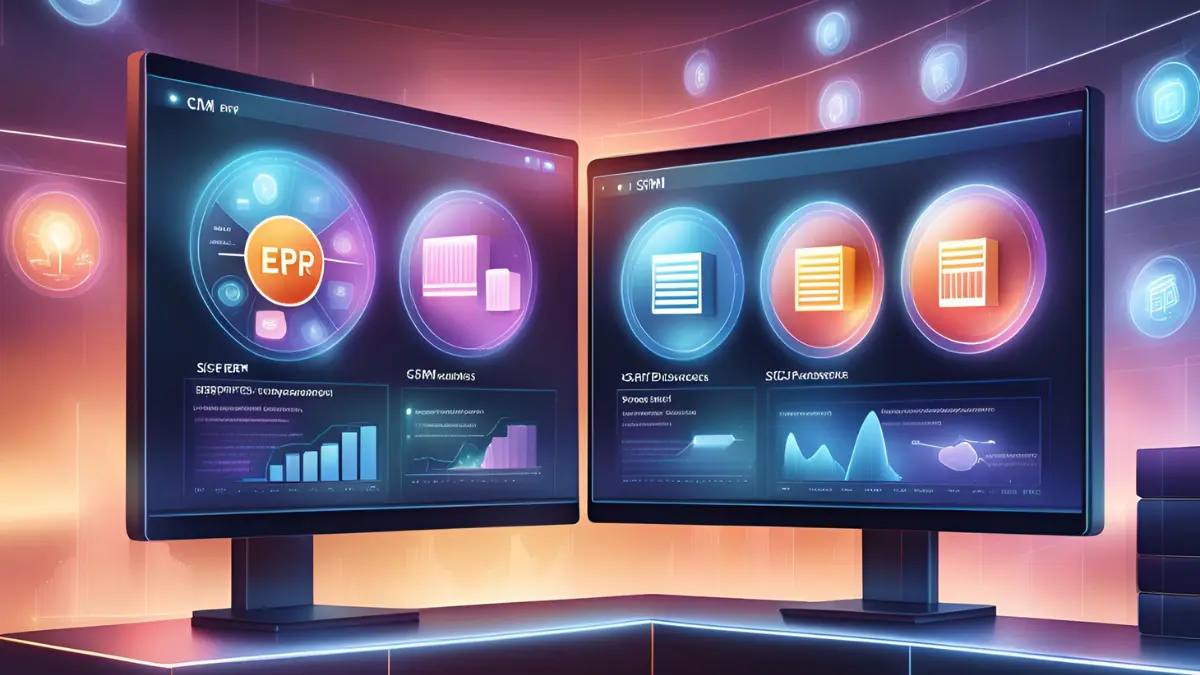In today’s fast-paced business landscape, achieving optimal efficiency and gaining a strategic advantage are essential for success. Two key systems that contribute significantly to these objectives are Enterprise Resource Planning (ERP) and Supply Chain Management (SCM). Understanding the differences between ERP vs SCM is crucial for businesses in Singapore to harness their full potential and embrace sustainable growth.
In this article, we will delve into the intricacies of ERP and SCM, exploring their core functions and the benefits they offer to businesses of all sizes. By unraveling these differences, you will gain valuable insights into how ERP vs SCM drive business efficiency and unlock strategic advantages.
As we dive deeper into the world of ERP and SCM, we will discuss how these systems contribute to cost savings, improve customer experiences, enhance data security, and serve as the backbone of logistics. Furthermore, we will examine real-world examples, shedding light on how Singapore-based companies have successfully harnessed ERP and SCM systems to gain a competitive edge.
To illustrate the nuances between ERP and SCM, we have prepared a visually engaging infographic that outlines the unique features and operational focuses of these systems. This visual aid will allow you to grasp the distinctions between ERP and SCM effortlessly.
Whether your business is just starting out or you’re looking to optimize your existing operations, understanding the role ERP and SCM play in driving business excellence is pivotal. Join us on this journey as we uncover the secrets behind ERP and SCM, equipping you with the knowledge to make informed decisions that will propel your business forward.
Key Takeaways
|
Table of Content:
Table of Content

Defining the Building Blocks: ERP Systems
ERP systems serve as the foundation of efficient and streamlined business operations. These comprehensive software solutions integrate and automate various essential processes, including financial management, procurement, and inventory management. By implementing an ERP system, you can benefit from its diverse functions and capabilities tailored to your business needs.
One of the key advantages of ERP systems is their high level of customization and scalability. You can configure the system to align with your specific requirements, ensuring optimal performance and efficiency. This flexibility enables businesses in Singapore to adapt the ERP system according to their industry, company size, and operational complexity.
Implementing an ERP system offers significant cost savings through automation. By automating repetitive tasks and streamlining processes, businesses can reduce manual effort, increase productivity, and minimize errors. Furthermore, accurate and up-to-date data provided by ERP systems allows for informed decision-making and resource allocation, leading to better cost management and optimization.
Customer experiences receive a significant boost with ERP systems. Streamlined processes and centralized information result in faster response times, better order management, and improved customer satisfaction. With ERP, you can provide real-time updates on order status and delivery, ensuring transparency and building trust with your customers.
Another critical aspect of ERP systems is data security. By centralizing and standardizing data, you can enhance information security and mitigate the risk of data breaches. ERP systems facilitate controlled access to sensitive information, ensuring that only authorized personnel can view and modify data.
With its wide range of functions and benefits, implementing an ERP system is essential for businesses seeking operational excellence and competitiveness in the dynamic business landscape of Singapore. The following sections will further delve into the core features of ERP systems and how they differentiate from SCM software.
Exploring SCM Software: The Backbone of Logistics
SCM software plays a crucial role in optimizing and managing the flow of goods along the supply chain. Designed specifically for supply chain management, this software aims to achieve several key objectives that enhance collaboration, inventory management, efficiency, and productivity.
One of the primary objectives of SCM software is to improve collaboration among supply chain partners. Businesses can establish seamless communication channels by leveraging SCM software, enabling real-time information sharing and decision-making. This enhanced collaboration fosters stronger relationships with suppliers, distributors, and other stakeholders, ultimately leading to smoother operations and reduced delays.
Efficient inventory management is another critical objective of SCM software. By providing real-time visibility into inventory levels and movement, this software allows businesses to optimize stocking levels, reduce inventory holding costs, and prevent stockouts or overstock situations. With SCM software, companies can accurately forecast demand, streamline procurement processes, and implement effective inventory replenishment strategies.
Furthermore, SCM software significantly contributes to improving overall efficiency and productivity. It automates manual tasks, eliminates redundant processes, and facilitates streamlined logistics operations. With features such as automated order fulfillment, transportation management, and warehouse management, businesses can minimize errors, reduce lead times, and maximize resource utilization. This increased efficiency not only improves customer satisfaction but also enables cost savings and competitive advantages.
In summary, SCM software serves as the backbone of logistics by enabling robust collaboration, efficient inventory management, and streamlined operations. By embracing SCM software, businesses can achieve better coordination and synchronization throughout their supply chains, improving efficiency and productivity.
Delineating the Distinctions: Comparative Analysis of ERP and SCM
When it comes to managing business processes and optimizing supply chain operations, ERP and SCM systems offer unique features and operational focuses. ERP systems, short for Enterprise Resource Planning, provide a comprehensive solution that covers a wide range of business processes. On the other hand, SCM systems, or Supply Chain Management systems, focus specifically on managing and improving supply chain operations. Understanding the distinctions between these systems is crucial for businesses seeking to enhance their operational efficiency and gain a competitive edge.
In this section, we will compare and analyze the unique features of ERP vs SCM systems. By thoroughly examining each system’s functionalities, capabilities, and operational focus, you’ll gain a comprehensive understanding of their differences and benefits. We will delve into the distinctive characteristics that make ERP and SCM systems essential for businesses in Singapore and globally.
To aid in your understanding, we have prepared an infographic that visually showcases the contrasts between ERP vs SCM systems. This visually engaging format will allow you to grasp the distinctions quickly and comprehensively, enabling you to make informed decisions about which system best suits your business needs.
How ERP Complements SCM: Integration for Streamlined Operations
Integrating Enterprise Resource Planning (ERP) with Supply Chain Management (SCM) can bring significant benefits to businesses. In Singapore, several companies have successfully leveraged the integration of ERP vs SCM systems to streamline their operations.
One such example is Company X, a leading e-commerce retailer based in Singapore. By integrating their ERP system with SCM software, Company X was able to automate their order fulfillment process, resulting in faster order processing and improved inventory management. This integration allowed them to reduce costs, enhance customer satisfaction, and achieve higher operational efficiency.
Company Y which specializes in manufacturing and distribution, implemented ERP and SCM integration to optimize its supply chain. By linking their ERP system with SCM software, they achieved better visibility and control over their inventory, reducing stockouts and minimizing excess inventory. Company Y experienced improved demand forecasting accuracy, reduced lead times, and a significant increase in overall supply chain efficiency.
The benefits of ERP vs SCM integration are not limited to specific industries or company sizes. By evaluating your business needs, you can determine the appropriate system(s) to implement. By integrating ERP with SCM, you can streamline operations, improve efficiency, and gain a competitive edge. The evolving technologies in ERP and SCM systems present further opportunities for businesses in Singapore and globally to enhance their operations and adapt to changing market demands.






















































